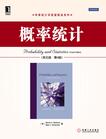概率统计
出版时间:2012-7 出版社:机械工业出版社 作者:(美)Morris H.DeGroot,(美)Mark J.Schervish 页数:891
Tag标签:无
内容概要
这本举世公认的经典概率论与数理统计教材,几十年来畅销不衰,被很多名校采用,包括卡内基-梅隆大学、哈佛大学、麻省理工学院、华盛顿大学、芝加哥大学、康奈尔大学、杜克大学、加州大学洛杉矶分校等。
《华章统计学原版精品系列:概率统计(英文版·第4版)》包括概率论、数理统计两部分,内容丰富完整,适当地选择某些章节,可以作为一学年的概率论与数理统计课程的教材,亦可作为一学期的概率论与随机过程的教材。适合数学、统计学、经济学等专业高年级本科生和研究生用,也可供统计工作人员用作参考书。
作者简介
Morris
H.DeGroot(1931-1989),世界著名的统计学家。生前曾任国际统计学会、美国科学促进会、统计学会、数理统计学会、计量经济学会会士。卡内基·梅隆大学教授,1957年加入该校,1966年创办该校统计系。DeGroot在学术上异常活跃和多产,曾发表一百多篇论文,还著有Optimal
StatisOcal Decisions和Statistics and the
Lawo为纪念他的著作对统计教学的贡献,国际贝叶斯分析学会特别设立了DeGroot奖表彰优秀统计学著作。
Mark
J.Schervish,世界著名的统计学家,美国统计学会、数理统计学会会士。于1979年获得伊利诺伊大学的博士学位,之后就在卡内基·梅隆大学统计系工作,教授数学、概率、统计和计算金融等课程,现为该系系主任。Schervish在学术上非常活跃,成果颇丰,还因在统计推断和贝叶斯统计方面的基石性工作而闻名,除本书外,他还著有Theory
ofStatistics和 Rethinking the Foundations of Statistics。
书籍目录
1 introduction to probability
1.1 the history of probability
1.2 interpretatio of probability
1.3 experiments and events
1.4 set theory
1.5 the definition of probability
1.6 finite sample spaces
1.7 counting methods
1.8 combinatorial methods
1.9 multinomial coefficients
1.10 the probability of a union of events
1.11 statistical swindles
1.12 supplementary exercises
2 conditional probability
2.1 the definition of conditional probability
2.2 independent events
2.3 bayes’ theorem
2.4 the gambler’s ruin problem
2.5 supplementary exercises
3 random variables and distributio
3.1 random variables and discrete distributio
3.2 continuous distributio
3.3 the cumulative distribution function
3.4 bivariate distributio
3.5 marginal distributio
3.6 conditional distributio
3.7 multivariate distributio
3.8 functio of a random variable
3.9 functio of two or more random variables
3.10 markov chai
3.11 supplementary exercises
4 expectation
4.1 the expectation of a random variable
4.2 properties of expectatio
4.3 variance
4.4 moments
4.5 the mean and the median
4.6 covariance and correlation
4.7 conditional expectation
4.8 utility
4.9 supplementary exercises
5 special distributio
5.1 introduction
5.2 the bernoulli and binomial distributio
5.3 the hypergeometric distributio
5.4 the poisson distributio
5.5 the negative binomial distributio
5.6 the normal distributio
5.7 the gamma distributio
5.8 the beta distributio
5.9 the multinomial distributio
5.10 the bivariate normal distributio
5.11 supplementary exercises
6 large random samples
6.1 introduction
6.2 the law of large numbe
6.3 the central limit theorem
6.4 the correction for continuity
6.5 supplementary exercises
7 estimation
7.1 statistical inference
7.2 prior and posterior distributio
7.3 conjugate prior distributio
7.4 bayes estimato
7.5 maximum likelihood estimato
7.6 properties of maximum likelihood estimato
7.7 sufficient statistics
7.8 jointly sufficient statistics
7.9 improving an estimator
7.10 supplementary exercises
8 sampling distributio of estimato
8.1 the sampling distribution of a statistic
8.2 the chi-square distributio
8.3 joint distribution of the sample mean and sample
variance
8.4 the t distributio
8.5 confidence intervals
8.6 bayesian analysis of samples from a normal
distribution
8.7 unbiased estimato
8.8 fisher information
8.9 supplementary exercises
9 testing hypotheses
9.1 problems of testing hypotheses
9.2 testing simple hypotheses
9.3 uniformly most powerful tests
9.4 two-sided alternatives
9.5 the t test
9.6 comparing the mea of two normal
distributio
9.7 the f distributio
9.8 bayes test procedures
9.9 foundational issues
9.10 supplementary exercises
10 categorical data and nonparametric methods
10.1 tests of goodness-of-fit
10.2 goodness-of-fit for composite hypotheses
10.3 contingency tables
10.4 tests of homogeneity
10.5 simpson’s paradox
10.6 kolmogorov-smirnov tests
10.7 robust estimation
10.8 sign and rank tests
10.9 supplementary exercises
11 linear statistical models
11.1 the method of least squares
11.2 regression
11.3 statistical inference in simple linear regression
11.4 bayesian inference in simple linear regression
11.5 the general linear model and multiple regression
11.6 analysis of variance
11.7 the two-way layout
11.8 the two-way layout with replicatio
11.9 supplementary exercises
12 simulation
12.1 what is simulation?
12.2 why is simulation useful?
12.3 simulating specific distributio
12.4 importance sampling
12.5 markov chain monte carlo
12.6 the bootstrap
12.7 supplementary exercises
tables
a we to odd-numbered exercises
references
index
章节摘录
版权页: 插图: The events B1, B2,……B11 in Example 2.1.12 can be thought of in much the same way as the two events B1 and B2 that determine the mixture of long and short bolts in Example 2.1.11. There is only one box of bolts, but there is uncertainty about its composition. Similarly in Example 2.1.12, there is only one group of patients,but we believe that it has one of 11 possible compositions determined by the events B1, B2,……B11. To call these events, they must be subsets of the sample space for the experiment in question. That will be the case in Example 2.1.12 if we imagine that the experiment consists not only of observing the numbers of successes and failures among the patients but also of potentially observing enough additional patients to be able to compute p, possibly at some time very far in the future. Similarly, in Example 2.1.11, the two events B1 and B2 are subsets of the sample space if we imagine that the experiment consists not only of observing one sample bolt but also of potentially observing the entire composition of the box. Throughout the remainder of this text, we shall implicitly assume that experi-ments are augmented to include outcomes that determine the values of quantities such as p. We shall not require that we ever get to observe the complete outcome of the experiment so as to tell us precisely what p is, but merely that there is an exper-iment that includes all of the events of interest to us, including those that determine quantities like p.Augmented Experiment. If desired, any experiment can be augmented to include the potential or hypothetical observation of as much additional information as we would find useful to help us calculate any probabilities that we desire. Definition 2.1.3 is worded somewhat vaguely because it is intended to cover a wide variety of cases. Here is an explicit application to Example 2.1.12.
编辑推荐
《概率统计(英文版•第4版)》中内容丰富完整,适当地选择某些章节,可以作为一学年的概率论与数理统计课程的教材,亦可作为一学期的概率论与随机过程的教材。
图书封面
图书标签Tags
无
评论、评分、阅读与下载
用户评论 (总计20条)
- 书很厚,还英文版的!很多内容和 统计学 重复!不过有自己的新知识点
- 这本书非常好,正版包装很精致。但是足足有近900页,想读下来需要时间。为下学期的留学生定的教材,但是犹豫用还是不用这套,实在太厚了,但是绝对是好书,赞!
- 比较厚、慢慢读
- 期待很久的一本书,非常好看 ,很值得拼读。
- 还未打开,看起来不错,不过这本书太贵了。
- 还没有开始看,不过要留学吗,这点苦还是要吃的。O(∩_∩)O哈哈~
- 哥大观光团强烈推荐!
- 值得仔细阅读,慢慢啃了要
- 数质量还可以,有点小贵
- 英文版的,需要点基础
- 质量很好,但觉得有点小贵
- 气场((畅销升级版)
- 书的内容很好,写得很详细。书的质量还可以做得更好一点
- 书的内容还不错,打算好好看
- 质量好,送货快,书很经典
- 这本书应该还是不错的,外国有不少名校,譬如哈佛,都是用这本书的。
- 读了两下就读不下去。数学味太浓。纯属老式教学,新生代看到这种书就没有兴趣了。
- 严谨程度Mendenhall(statistics for engineers and the sciences)<Rice(mathematical statistics and data analysis)<<本书 思路清晰,例子也很多,特别适合希望“知其所以然”的读者
- 非常好,非常好,亚马逊的服务、书,都很好!!!太值了!
- 不愧为最好的关于概率统计的教材。强烈推荐,比国内的书要好的多啊。
相关图书
- 从政12讲
- 2013B版五年高考三年模拟高考历史
- 我们在长大.爸妈在变老-谢谢你还在
- 一辈子.三万天-不生气的活法
- 2012年-经济法基础-会计职称全国统一考试最后冲刺-密押试卷-购正版辅导赠50元面授串讲券详见内文-内附2009-2010-2
- 2012年-初级会计实务-会计职称全国统一考试最后冲刺-密押试卷-购正版辅导赠50元面授串讲券详见内文-内附2009-2010-2011年真题及解析
- 舟山群岛海洋文化概论
- 初中文言文课内外巩固与拓展
- 黑龙江民间故事(套装共3册)
- 2012天一信息卷·全国及各省市高考真题透析
- 天一文化·天一信息卷·全国及各省市高考真题透析
- 2012天一信息卷·全国及各省市高考真题透析
- 三年级语文上 R版
- 2012天一信息卷·全国及各省市高考真题透析
- 棉花优质高产的定量计算和决策
- 初中新课标阅读文言文课外拓展训练
- 应用文写作
- 固体光电子学
- 12秋典中点三年级英语上 PEP版
- 经典老连环画(套装共2册)
- 一年级语文R版上
- 百叶窗-美国高校招生指南
- 2012天一信息卷·全国及各省市高考真题透析
- 初中文言文课内外巩固与拓展
- 天一信息卷·2012全国及各省市高考真题透析
